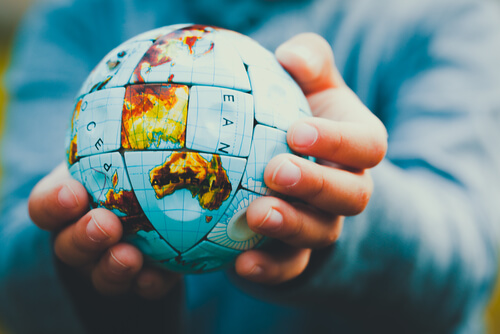How to Be a Conscious Consumer

Nowadays, we’re bombarded by an excessive and unfiltered flow of products, services, and information. Businesses that are interested in creating those products that you just “can’t live without” hire intelligent people to dedicate all their time and effort to make you want their product. They either create new desires or reinforce those that already exist. In this context of frenzied marketing and consumerism, it’s important to talk about the conscious consumer.
Let’s start with the definition. A consumerist society, according to the Cambridge Dictionary, is “a society in which people often buy new goods, especially goods that they do not need, and in which a high value is placed on owning many things”. To be conscious, according to the same dictionary, is to be “aware of oneself and one’s surroundings“.
Therefore, conscious consumption is related to acquiring goods and services that are pro-sustainability. Also, it promotes choices that take into account our responsibility to be aware of the impact we have on our surroundings. That involves being considerate of ourselves, others, and the environment.

Conscious consumers break down barriers
Conscious consumption is a movement that encourages you not to be indifferent to the effect of consumption on nature and other beings. In addition, it encourages you to reflect on what you invest in, which means that everyone can be a conscious consumer.
To be a conscious consumer, you have to be more aware of your behaviors, thoughts, and emotions. It’s helpful to have good communication with your inner self so you’ll know what options to choose, as well as the reasons you’re making those choices. If you do that, you’ll be able to be a more assertive consumer.
Emphasizing the impact that your consumption has on nature and on people is also crucial. To do so, you need to cultivate compassion and empathy, both wonderful tools that allow you to have healthy interactions with others.
In addition, it’s important to keep the environment in mind, not just your immediate needs. To do so, ask yourself what kinds of things you could do to help the environment. You don’t have to do everything all at once. The important thing is to choose alternatives that are less destructive to the environment and are better for the well-being of everyone (and everything).
How to digest information
A large part of current consumption is based on information-based strategies to get you to buy or acquire particular services. Conscious consumption isn’t about completely eliminating consumption. Instead, it invites you to choose the things you truly need and find products and services that are good for everyone. Consequently, we have to highlight the importance of information.
One responsibility of the conscious consumer is to figure out if they’re falling into the trap of information overload or if they’re actually selecting the information they need and that’s important to their well-being. That doesn’t mean you have to look at digital marketing as your worst enemy, but it does mean you should use it to your advantage and set some boundaries.
Above all, the conscious consumer is aware of the impact that they have on the rest of the world. So, when you’re engaging in some kind of consumption, ask yourself, “Do I need this product?”, and “What kind of impact does its production have.”
You can also help by raising awareness about initiatives that promote positive investment and goods acquisition. There are small things you can do that you might not notice or be informed about.
Beliefs and values
As Albert Vinyals i Ros writes in his doctoral thesis, talking about sustainable consumption is considered acceptable in a changeable society with more and more evidence for the existence of climate change. However, it seems that there’s quite a difference between what people say and what they do.
Studies show that the environment is one of the factors that carry the least weight when it comes to deciding what to buy. Variables such as price or aesthetics tend to be higher on the list.
Thus, for consumption to happen in a conscious way, you should focus on adopting values that help you have the most positive impact possible. That promotes well-being for humans and the planet. Some of the values that will help you do that are the following:
- Respect
- Authenticity
- Altruism
- Empathy
- Ethics
Thus, the conscious consumer knows how valuable it is to only have what they really need. They also give ethical advice and understand the power that they have to recommend as well as buy. In addition, they buy source goods and services from socially responsible companies.
Motivation
When you perceive that a particular action has some kind of benefit, it reinforces your behavior and you’re more likely to repeat that action. In fact, one factor that makes it harder to be a conscious consumer is that comfort and ease are powerful motivators. To be a conscious consumer, you have to step outside your comfort zone.
Getting yourself out of your comfort zone requires intrinsic motivation. In other words, you have to get satisfaction from doing things in order to have a positive impact. If you achieve that, you’ll be participating in transformative consumption.
Consumption habits
Habits are repetitive forms of behavior. Therefore, to be a conscious consumer, you have to make your habits more sustainable. They have to be in harmony with your emotions and your finances, or you won’t be able to do them over a long period of time.
One way to change your habits is to stop prioritizing comfort and to stop being lazy. Laziness can lead to procrastination, and you’ll end up watching time pass with no real changes in your life.
You can also read books or guides that help you make more environmentally friendly choices. Daniel Goleman’s book, for example, invites you to recognize the hidden impacts of the things you buy and use.

Planning helps you be a conscious consumer
Good planning is one way to be a more conscious consumer. It helps establish priorities and follow them. On the other hand, your buying power and price are also important factors. That includes trying not to endanger your future.
You can also make an investment plan. Remember that conscious consumption doesn’t just have to do with the environment and other people, but also with yourself. Ask yourself questions such as, “Is buying this good for me?” or “How does this product harm or benefit my physical, emotional, and social health?”
In conclusion, each one of us has the ability to be a more conscious consumer and help others do the same. It’s beneficial for nature, other people, and ourselves. Thus, do your part for collective and individual well-being. By keeping the environmental and social impact of consumption in mind, together, we can improve our quality of life.
Nowadays, we’re bombarded by an excessive and unfiltered flow of products, services, and information. Businesses that are interested in creating those products that you just “can’t live without” hire intelligent people to dedicate all their time and effort to make you want their product. They either create new desires or reinforce those that already exist. In this context of frenzied marketing and consumerism, it’s important to talk about the conscious consumer.
Let’s start with the definition. A consumerist society, according to the Cambridge Dictionary, is “a society in which people often buy new goods, especially goods that they do not need, and in which a high value is placed on owning many things”. To be conscious, according to the same dictionary, is to be “aware of oneself and one’s surroundings“.
Therefore, conscious consumption is related to acquiring goods and services that are pro-sustainability. Also, it promotes choices that take into account our responsibility to be aware of the impact we have on our surroundings. That involves being considerate of ourselves, others, and the environment.

Conscious consumers break down barriers
Conscious consumption is a movement that encourages you not to be indifferent to the effect of consumption on nature and other beings. In addition, it encourages you to reflect on what you invest in, which means that everyone can be a conscious consumer.
To be a conscious consumer, you have to be more aware of your behaviors, thoughts, and emotions. It’s helpful to have good communication with your inner self so you’ll know what options to choose, as well as the reasons you’re making those choices. If you do that, you’ll be able to be a more assertive consumer.
Emphasizing the impact that your consumption has on nature and on people is also crucial. To do so, you need to cultivate compassion and empathy, both wonderful tools that allow you to have healthy interactions with others.
In addition, it’s important to keep the environment in mind, not just your immediate needs. To do so, ask yourself what kinds of things you could do to help the environment. You don’t have to do everything all at once. The important thing is to choose alternatives that are less destructive to the environment and are better for the well-being of everyone (and everything).
How to digest information
A large part of current consumption is based on information-based strategies to get you to buy or acquire particular services. Conscious consumption isn’t about completely eliminating consumption. Instead, it invites you to choose the things you truly need and find products and services that are good for everyone. Consequently, we have to highlight the importance of information.
One responsibility of the conscious consumer is to figure out if they’re falling into the trap of information overload or if they’re actually selecting the information they need and that’s important to their well-being. That doesn’t mean you have to look at digital marketing as your worst enemy, but it does mean you should use it to your advantage and set some boundaries.
Above all, the conscious consumer is aware of the impact that they have on the rest of the world. So, when you’re engaging in some kind of consumption, ask yourself, “Do I need this product?”, and “What kind of impact does its production have.”
You can also help by raising awareness about initiatives that promote positive investment and goods acquisition. There are small things you can do that you might not notice or be informed about.
Beliefs and values
As Albert Vinyals i Ros writes in his doctoral thesis, talking about sustainable consumption is considered acceptable in a changeable society with more and more evidence for the existence of climate change. However, it seems that there’s quite a difference between what people say and what they do.
Studies show that the environment is one of the factors that carry the least weight when it comes to deciding what to buy. Variables such as price or aesthetics tend to be higher on the list.
Thus, for consumption to happen in a conscious way, you should focus on adopting values that help you have the most positive impact possible. That promotes well-being for humans and the planet. Some of the values that will help you do that are the following:
- Respect
- Authenticity
- Altruism
- Empathy
- Ethics
Thus, the conscious consumer knows how valuable it is to only have what they really need. They also give ethical advice and understand the power that they have to recommend as well as buy. In addition, they buy source goods and services from socially responsible companies.
Motivation
When you perceive that a particular action has some kind of benefit, it reinforces your behavior and you’re more likely to repeat that action. In fact, one factor that makes it harder to be a conscious consumer is that comfort and ease are powerful motivators. To be a conscious consumer, you have to step outside your comfort zone.
Getting yourself out of your comfort zone requires intrinsic motivation. In other words, you have to get satisfaction from doing things in order to have a positive impact. If you achieve that, you’ll be participating in transformative consumption.
Consumption habits
Habits are repetitive forms of behavior. Therefore, to be a conscious consumer, you have to make your habits more sustainable. They have to be in harmony with your emotions and your finances, or you won’t be able to do them over a long period of time.
One way to change your habits is to stop prioritizing comfort and to stop being lazy. Laziness can lead to procrastination, and you’ll end up watching time pass with no real changes in your life.
You can also read books or guides that help you make more environmentally friendly choices. Daniel Goleman’s book, for example, invites you to recognize the hidden impacts of the things you buy and use.

Planning helps you be a conscious consumer
Good planning is one way to be a more conscious consumer. It helps establish priorities and follow them. On the other hand, your buying power and price are also important factors. That includes trying not to endanger your future.
You can also make an investment plan. Remember that conscious consumption doesn’t just have to do with the environment and other people, but also with yourself. Ask yourself questions such as, “Is buying this good for me?” or “How does this product harm or benefit my physical, emotional, and social health?”
In conclusion, each one of us has the ability to be a more conscious consumer and help others do the same. It’s beneficial for nature, other people, and ourselves. Thus, do your part for collective and individual well-being. By keeping the environmental and social impact of consumption in mind, together, we can improve our quality of life.
All cited sources were thoroughly reviewed by our team to ensure their quality, reliability, currency, and validity. The bibliography of this article was considered reliable and of academic or scientific accuracy.
Vinyals I Ros, A. El consumidor consiente análisis de los factores psicosociales implicados en el consumo sostenible a partir del estudio de miembros de cooperativas de consumo agro-ecológico. Universitat Autònoma de Barcelona.
Goleman, D. (2010). Inteligencia Ecológica. Barcelona: Kairos.
This text is provided for informational purposes only and does not replace consultation with a professional. If in doubt, consult your specialist.







